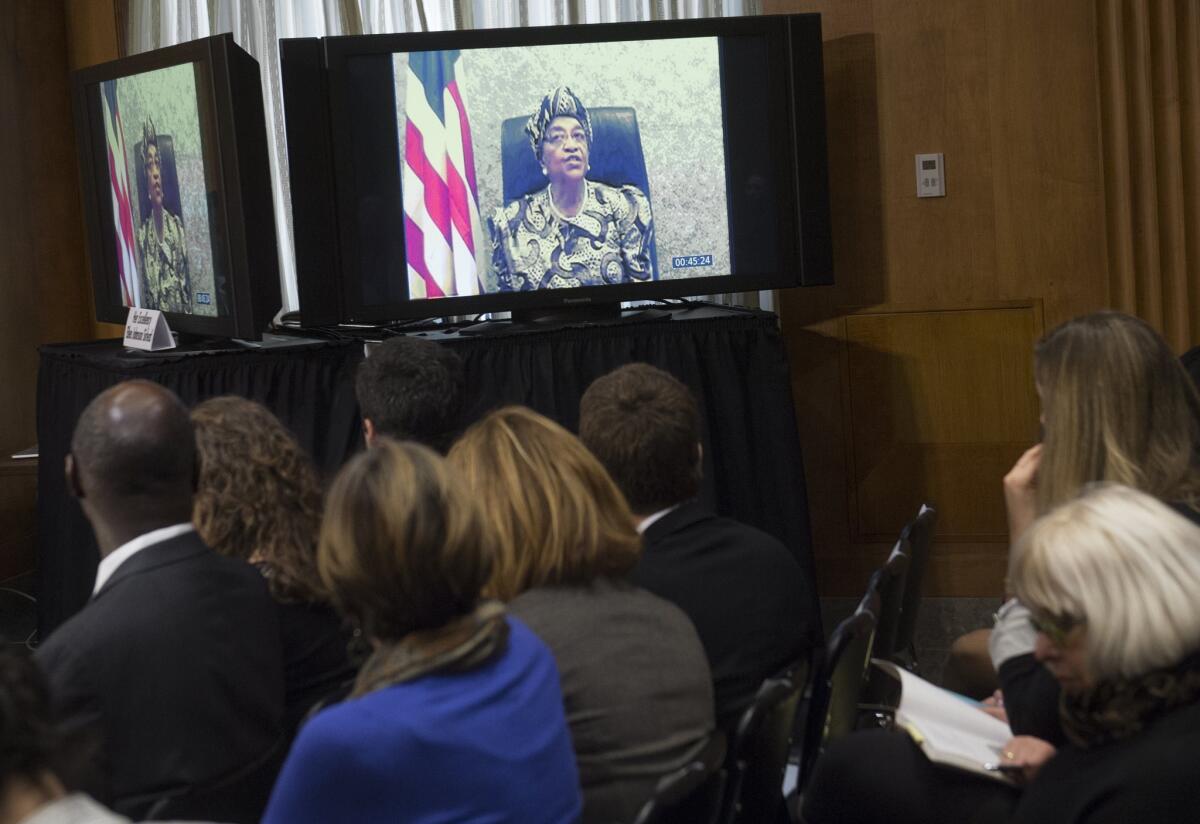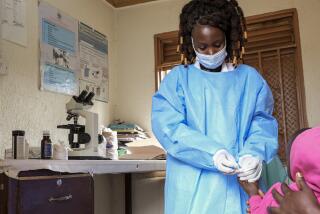Liberian president warns that Ebola still threatens her nation

- Share via
Reporting from Washington — Liberian President Ellen Johnson Sirleaf thanked the Obama administration Wednesday for its efforts in stemming the tide of the country’s Ebola outbreak, but warned that the disease was still a threat in her developing nation.
The American response, a combination of funding and military aid, helped galvanize other countries to join the fight against the epidemic in West Africa, she told the Senate Foreign Relations Committee over video link.
“It was the leadership of the Obama administration supported by Congress that opened the space for the disease to stabilize in Liberia and encouraged the rest of the world to respond to this global crisis,” she said.
The country’s 13 Ebola treatment centers, some established by the American military, now only have 136 patients total, she said, and the country is seeing an average of 10 new cases per day, as opposed to 100 at the height of the outbreak that centered on Liberia and two other West African countries, Guinea and Sierra Leone.
But the Liberian leader emphasized that despite her nation’s gains, she would not consider the outbreak extinguished until all neighboring countries were free of the disease. As Liberia’s cases decline, both Sierra Leone and Guinea have seen diagnoses increase in recent months. Mali has also seen six deaths from the virus.
“Full eradication will not be secured until the whole region is free from Ebola,” Johnson Sirleaf said.
The Ebola virus swept through the region this year, sickening than 17,000 people and killing more than 6,000, according to joint estimates from the Centers for Disease Control in Prevention and the World Health Organization.
Johnson Sirleaf emphasized the long-term damage Ebola has done to her country, which is recovering from a decade of conflict. The epidemic has slowed or stopped infrastructure growth, shuttered schools and devastated the country’s already weak health system, she said.
And, she noted, the outbreak has led to panic globally.
“The disease has subjected us to a stigma all over the world, creating a fear more destructive than Ebola itself,” she said.
Public health experts joining Johnson Sirleaf on Capitol Hill echoed her calls for rebuilding West Africa’s health infrastructure as the key to stopping the outbreak and preventing future epidemics. The country has one doctor per 100,000 residents, the president said.
“When Ebola is done, my desperate fear is the tents will be rolled up and the expats will go home, and what will be left will be the previous health system that will be even more broken than before Ebola came,” said Dr. Anne Peterson of World Vision.
West African medical systems will benefit more from formal training programs to develop skills than from additional international dialogue, said Dr. Paul Farmer, who leads the global health nonprofit Partners In Health.
“A workshop is not what we need. There’s so much human capital in this part of the world, there’s so much talent. Give them a chance to get formal training,” he said.
Experts said that continued American assistance was essential, including ongoing logistical efforts from the military and funding for long-term public health development, in stemming the outbreak.
Lawmakers are debating a request from President Obama for an additional $6.18 billion for domestic preparation and West African relief during budget negotiations this week.
More to Read
Sign up for Essential California
The most important California stories and recommendations in your inbox every morning.
You may occasionally receive promotional content from the Los Angeles Times.












